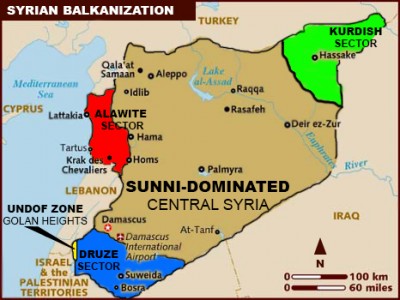 By David Ignatius,
By David Ignatius,
The world still talks about Syria as if it’s a single country, but some members of the Syrian opposition are beginning to discuss the reality that Syria today is effectively partitioned — complicating any negotiated solution to the conflict.
This frank approach was outlined in an interview last week with Samir al-Taqi, a Syrian physician who was once close to the regime but left the country two years ago and now runs his Orient Research Center, a Syria think tank, from Dubai.
Taqi offered some practical examples to illustrate the lasting effects of the conflict between the Alawite-led regime of President Bashar al-Assad and the largely Sunni opposition. It would be decades, he said, before an Alawite teacher would be comfortable giving lectures in the Sunni districts of northern Aleppo about late president Hafez al-Assad. Similarly, it would be decades before a Sunni police officer would feel safe patrolling in a Shiite or Alawite village.
What this means, said Taqi, is that any attempt to broker a diplomatic solution must begin with a cease-fire, and with combatants holding different slices of territory. The future Syria that emerges will have to be a more decentralized state, reflecting the intense feelings of communal separation and rage that have emerged over the past two years of war.
This blunt analysis is useful as the United States and Russia explore arrangements for a Geneva peace conference, perhaps in October, that might bring together the regime and the opposition for talks. “It may not be possible to reestablish a national convention based on a central state,” warned Taqi in a recent research paper. “We need . . . a state where all regions have a high percentage of decentralization.”
Taqi argued that as the Alawite-led regime and the Sunni opposition hunker down in the regions they control, they are turning to external powers for their political and economic lifelines.
The Assad regime depends on its patrons in Iran and the Iranian-backed Hezbollah militia in neighboring Lebanon. The regime has focused on holding the strip of territory from Damascus to the Alawite homeland of Latakia in the northwest, relying on perhaps 100,000 regime troops and Alawite militiamen, plus Hezbollah fighters. This “Assad-istan” is, practically speaking, an extension of the Hezbollah-controlled Bekaa Valley.
The Sunni-led opposition is similarly turning to its regional patrons. Taqi noted that Syrian olive-oil producers moved their presses to Turkey. Likewise, the wheat harvest in northern Syria has gone to Turkey, while petroleum is being shipped to either Turkey or Iraqi Kurdistan. Economic activity in the liberated Sunni regions of southern Syria around Daraa is now linked to Jordan. Damascus isn’t the country’s economic hub any longer.
These regional players, with their own agendas, will keep pulling Syria apart until a functioning national government can be reestablished. Taqi’s point is that these regional players shouldn’t be allowed to make the situation even worse for their own selfish reasons.
“The country should enter what is similar to a quarantine until it is cured from the sectarian disease,” he wrote. “Without doing so, there would be no peace after peace . . . The state would dissolve for good.”
What are the chances for gradually healing sectarian divisions, in the way Taqi urged? His approach is similar to what is recommended by Gen. Salim Idriss, the commander of the moderate wing of the Free Syrian Army. But it’s in stark contrast to the views of the al-Qaeda-linked extremists who have control of much of the liberated territory. These extreme groups speak of a jihadist emirate in their regions of Syria, perhaps linked with a similar al-Qaeda mini-state in the Sunni regions of western Iraq. As for the Kurdish opposition, it favors a Kurdish canton along the lines of Iraqi Kurdistan.
What’s happening in Syria isn’t an insurgency now but a sectarian civil war. A triumph by either side on the battlefield is the “zero solution,” said Taqi. The resolution must be political
The regime has seemed equally bent on division. “The manner in which the regime has responded to its opponents strongly suggests that it considers the bulk of the Syrian population and territory not even worth governing,” wrote Frederic Hof, a leading U.S.-Syria expert, in a paper published last week by the Atlantic Council’s Rafik Hariri Middle East Center. “Why else would it subject neighborhoods filled with Syrian citizens to merciless artillery shelling, aerial bombing, and missile strikes?”
What’s happening in Syria isn’t an insurgency now but a sectarian civil war. A triumph by either side on the battlefield is the “zero solution,” said Taqi. The resolution must be political — but grounded in a realistic assessment of the difficulty in putting the pieces of Syria back together.
Washington Post

Leave a Reply
You must be logged in to post a comment.